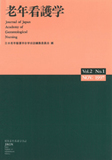Japanese
English
- 販売していません
- Abstract 文献概要
- 参考文献 Reference
本研究の目的は,痴呆性老人の摂食困難とそれに影響を及ぼす要因について検討し,ケアのあり方を探ることである.1994年9月の時点で,札幌市内にある某老人病院に入院中で,看護婦が摂食困難の状態にあると判断した65歳以上の患者60名について,そのケアに関わっている看護婦30名に対して実施した質問紙票を原資料とした.今回は,原資料の老人60名中「痴呆」と診断された48名を対象とし,分析した結果,以下の知見を得た.
1)痴呆性老人の摂食困難として,「摂食動作上の困難」「摂食リズムの乱れ」「むせ」の3つが挙げられた.
2)摂食動作上の困難は,主に痴呆の重症度や利き手側の上肢機能障害と関連していた.このうち「器から食物をすくう」動作については,痴呆の重症度のほかに食物形態,坐位保持の状態とも関連していた.
3)摂食を中断するような摂食リズムの乱れとして,「よそ見をする」「口を開けようとしない」「食物を口中に溜める」「手の動きが止まる」などの状態が多く挙げられた.
4)「むせ」は,痴呆の重症度や食物形態,坐位保持の状態と強く関連していることが示された.
痴呆性老人の摂食困難の中にはケアに依拠する要因も多く,摂食困難の特性を踏まえた援助を検討することで改善される摂食困難もありうることが示唆された.
The purpose of this study is to investigate feeding difficulties in elderly patients with dementia and the factors affecting these difficulties, and to describe the perspectives of care. A questionnaire survey was conducted in September 1994 on feeding difficulties experienced by 30 nurses working in a geriatric hospital in Sapporo in their care of 60 patients over 65 years old. Survey data on 48 dementia patients of the 60 patients with feeding difficulties were analyzed. The following results were obtained: 1) Feeding difficulties in elderly patients with dementia were classified into three items: difficulties in hand movement for eating, disorder of eating rhythm and choking. 2) Difficulties in hand movement for eating were related to the severity of dementia and functional disorder of the hand used for eating. Among these difficulties, movement taking food from the plate were correlated with the severity of dementia, sitting posture and the shape of food. 3) Disorder in eating rhythm such as interruption of feeding was mainly seen in actions by the patient during feeding; e. g., turning his/her head away while being fed, refusing to open his/ her mouth, refusing to swallow food, and stopping hand movement. 4) Choking was strongly related to the shape of food, the severity of dementia and sitting posture.
This study shows that many of the factors involved in feeding difficulties in elderly patients with dementia are related to the type of care given and that these feeding difficulties can be partially resolved by providing appropriate care that takes into account the characteristics of feeding difficulties in elderly patients with dementia.
Copyright © 1997, Japan Academy of Gerontological Nursing All rights reserved.


